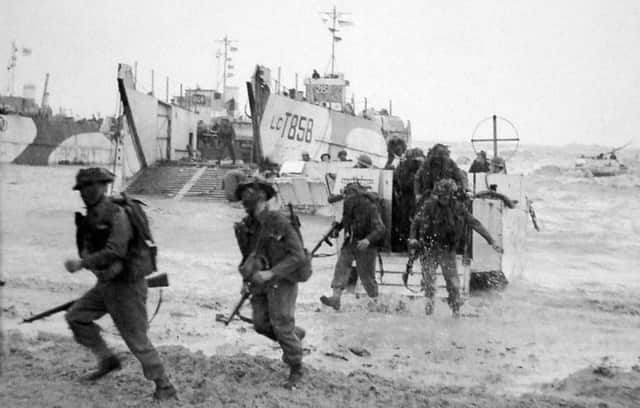The South Shields men who lost their lives making D-Day the success it was


One of the brave soldiers who took part that day was South Shields teenager Private Arthur Blakiston Bradley.
Private Bradley (14675224) was serving in 6th Bn Durham Light Infantry as he and his comrades stormed Gold Beach.
Advertisement
Hide AdAdvertisement
Hide AdHis regimental war diary describes how “the thrill of seeing the French coast early on June 6 was counteracted by the wretched feeling of seasickness which had come upon almost every man.
“During the whole of the crossing there was no enemy opposition either from sea or air. News of 69th Brigade’s successful operation (headed by 6th Green Howards) was received an hour before landing and the good work of this assault brigade enabled our own brigade to land without any opposition from the enemy, however we had a wet landing.”
Having successfully fought his way off the beach, Arthur, who was born on July 5, 1925, sadly died on June 14 during an attack by the 6th Durhams on Verrieres, during which the The Durham Light Infantry sustained 353 casualties.
He was the son of John and Isabella Bradley of Stanhope Road, South Shields The Durham Light Infantry had sustained 353 casualties to capture the village.
Advertisement
Hide AdAdvertisement
Hide AdThree days later Arthur’s comrade and another South Shields man, Staff Sgt Joseph Crombie (4460539), of the same battalion, was killed.
Dorothy explained that he was involved in a fierce fight against German forces, which included Panzer tanks, near Tilly-Sur-Seulles.
“At some point that day, he was killed and is buried in Tilly-Sur-Seulles War Cemetery. He was the son of Joseph and Margaret Crombie, of South Shields, who chose this epitaph for him: “In Memory Of Our Beloved. He Died That We Might Live. R.I.P.”
“Joseph was born in the town in 1920, and in 1939 the family were living at 148 Regent Street, and had been there since 1911.”
Advertisement
Hide AdAdvertisement
Hide AdAlso in 50th Northumbrian Division sector was South Shields-born Private Alfred Covell Shields (4463808) who served in 9th Bn Durham Light Infantry.
“On June 13,” said Dorothy, “Alfred’s 9th Battalion, which formed part of the 151st Brigade of 50th Northumbrian Division, was in charge of seizing Lingevres.
“That day they reached the northern edge of the forest and in the evening deployed a reconnaissance unit to find out the strength of the enemy defences.
“The Germans opened fire on their approach and destroyed two Sherman tanks and inflicted heavy losses on 9th Battalion Durham Light Infantry. Alfred died that night, Tuesday June 13, aged 30, and he is buried in Bayeux War Cemetery plot XI M1 where his epitaph reads: “Death Divides, Still Memory Clings”.
Advertisement
Hide AdAdvertisement
Hide Ad“He was the son of Robert and Alice Shields of South Shields.
The following day the Durhams were involved in a fierce battle to take Lingevres involving tank battling tank, and finally Spitfire fighters joined in the struggle, and the Germans were beaten back and retreated.
Back to D-Day itself, and before the sea-borne soldiers landed on the beaches, British airborne troops were parachuting into drop zones or landing in gliders to secure important bridges. One of them was South Shields man, Private Harold Clifford Trotman (14204750) who served in 7th Bn The Parachute Regiment.
Harold was killed at Le Mesnil on Sunday, June 18; he was just 21. The son of Benjamin and Margaret Ann Trotman, he is buried in Ranville War Cemetery.
Advertisement
Hide AdAdvertisement
Hide AdHis headstone in Normandy is inscribed: “Greater Love Hath No Man Than This, That A Man Lay Down His Life For His Friends”.
Another airborne serviceman from South Shields, was Private Gilbert Smith (14658563) who served in 13th Bn (Lancashire) The Parachute Regiment.
“On June 6,” says Dorothy, “the battalion dropped Dakota and Albermarle aircraft before moving off from the rendezvous point to the sound of a hunting horn.
“When Gilbert, who was the son of Thomas A and Jessie Smith, was killed on July 12, the 13th Paras were in Le Mesnil.
Advertisement
Hide AdAdvertisement
Hide Ad“On his military headstone, in Ranville War Cemetery, is the inscription: “Resting Where No Shadows Fall, In Perfect Peace He Awaits Us All”.
Marine James Walter Walker (EX/4267), of South Shields, served in 45 Royal Marine Commando, which landed on Sword Beach at 9.10am at La Breche, west of the River Orne.
“Many had a wet landing with some having to swim ashore carrying between 60 to 80lbs on their backs.
“They were to push inland and make contact with 6th Airborne division who were holding the bridges across the Caen Canal and River Orne, which they did at 2.15pm. Snipers were active in the area.
Advertisement
Hide AdAdvertisement
Hide Ad“The commandos then swung north to their objective of clearing the enemy out of Franceville-Plage.
James, who was 26 and the son of James and Harriet Walker, was killed on Monday, June 12. He is buried in Ranville War Cemetery. In 1939 the family was living at 82 Wharton Street.
Tomorrow, Dorothy reveals more of the roles played by Shields men on D-Day.